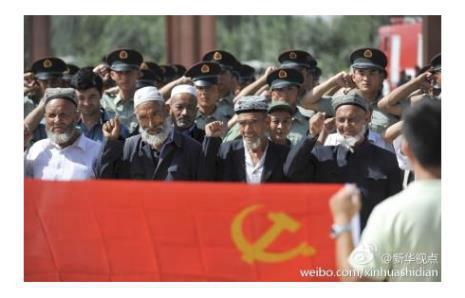
On a brisk morning 20 years ago, I was walking home to my house in Lower Roxbury. The date was Sept. 11, 2001.
As soon as I entered my house’s front door, my landline phone rang. It was one of my friends studying in Japan who made the long-distance call. Watching the international news from afar, he was checking up on me to make sure I was safe. In the aftermath of 9/11, shock, grief, suspicion, fear and anger filled American society. I still remember those tense days, which were filled with anxiety and uncertainty.
I walked down that same street in Lower Roxbury just last week, and I felt a lingering unease even after 20 years.
Twenty years ago, it was the United States that seemed to be viewing Muslims with suspicion. In the time since then, another powerful country has adopted unimaginable animosity toward its citizens of Islamic faith: China. Before the open eyes of the entire world in the 21st century, without considering its global reputation and the consequences of its actions, China has set up concentration camps to detain millions of my people – innocent Uyghurs — since 2017.
After 9/11 took place, Islamophobia began to take root in some parts of the United States, and even those perceived as Muslims suffered from hate crimes. Furthermore, the U.S.-led War on Terrorism worsened living situations for innocent Muslims around the world. Tyrannical governments around the world took advantage of this climate to crack down hard on their opponents or people they deemed different from themselves. For the crimes of a few, a whole community was victimized.
China is one such country that has treated human rights with impunity in the name of counterterrorism. Instead of respecting Uyghurs’ right to live as free people in their historic homeland, now known as the so-called “Uyghur Autonomous Region,” my people are denied even basic human rights. Today, millions of Uyghur, Kazakh and Krygyz people are still subjected to forced labor in “concentration camps.” Many children have been detained separately from their parents since 2017.
What China is committing against Uyghur, Kazakh and Kyrgyz people at this very moment is genocide, the most evil and extreme form of racism. These people are persecuted and imprisoned simply due to their ethnicity. As such, it is necessary to speak up against Chinese state-sponsored racism. Even on the basis of counterterrorism, putting millions of people into concentration camps solely because of ethnicity and faith is a crime against humanity that we must actively condemn.
Northeastern University enrolls thousands of students from Asia, and many come from China every year. I ask everyone, especially those from Asian countries that support China’s Uyghur policies, to denounce and oppose China’s state-sponsored racism against my people and to educate themselves on how they can speak up about it in their native countries.
We must acknowledge that racism is everywhere, yet its degree and manifestation differs depending on the location. It exists even in open and rule-based democratic societies. However, relatively speaking, these societies do acknowledge their shortcomings and strive to enhance dialogue among affected communities and resolve conflicts via legal means.
When I see Americans from all walks of life speak up against anti-Asian hate crimes in the United States, I often wish they could also broaden their scope to a global scale and oppose racism everywhere, be it in the United States or China.
We are already living in an interconnected and globalized world where a seemingly local incident can turn to global disaster — just think about COVID-19. The same can be said for social tragedies in places that are distant from the United States. Dictatorships ruling with impunity in faraway locations threaten us all by discrediting the power of international laws and norms.
I feel horrified with what China is doing to Uyghurs, Kazaks and Krygyz people. There were times where I was on the verge of losing confidence in the goodness of mankind and the power of international organizations that enforce international laws and rules. But now, I write this hoping that, as more peace- and justice-loving compatriots know of our suffering, they will take a stand against racism and hate crimes everywhere — even in places they might not believe to be relevant to their lives. Unless we oppose racism everywhere, none of us will be immune to racism anywhere.
Currently, humankind is experiencing the COVID-19 pandemic. We are cautiously hopeful that science can eradicate physical viruses like COVID-19, even if it takes time. But it takes courage, compassion, honesty and determination to fight other viruses like racism.
If we just talk about defeating COVID-19 but do nothing with racism, we will not have a society that is the best version of itself. Similarly, if we only fight to combat racism in one country but do not care enough about the misery that state-sponsored racism inflicts on innocent people in other parts of the world, the fight against racism will never be won. Thus, as we remember the global connectedness that binds us together as human beings, we must all strive to oppose racism everywhere with our words and deeds.
-------------------
Kaiser Mejit obtained his master’s degree in economics from Northeastern University and is a graduate of the T.H. Chan School of Public Health at Harvard University. He also holds a doctorate degree in economics from Suffolk University.
https://huntnewsnu.com/66423/editorial/op-ed-we-must-oppose-racism-everywhere/

